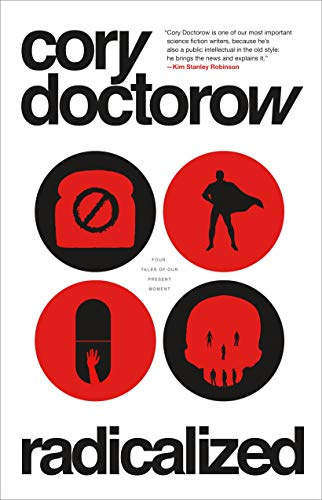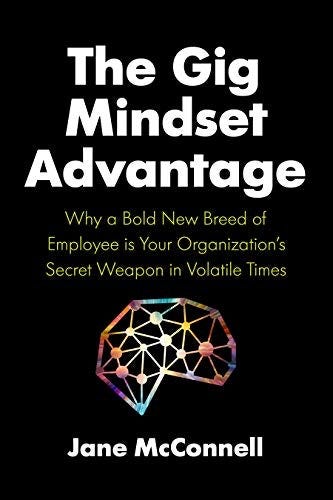New kids on the block - you and your toaster - scary tech - crafting your way
Many people who are part of the bold new breed of gig mindsetters inside organizations feel that they are “inside outsiders”. Why?
Inside outsiders combine the clarity and objectivity of being outside an organization with in-depth knowledge because they are inside. This unusual combination–rare in most organizations–is essential today, in people in general and especially in leaders.
The new kids on the block
“It’s the new kids on the block who worry us” - is the title of Issue 5 . Will you be replaced by a startup? What do you believe is a threat to your business today? Are you scanning the horizon, ready to act with flexibility?
Previous issues include “You can go rogue in your mind” - and talks about two success criteria that are ignored or unknown: serial mastery (ref: Lynda Gratton) and building a personal holding environment (ref: Gianpiero Petriglieri).
Tech is getting scary
Radicalized, by Cory Doctorow
See the website of this author on a mission
In the dedication at the beginning of the 4-part book Radicalized, Cory Doctorow quotes what his parents told him: “This isn’t the kind of fight we win, it’s the kind of fight we fight.”
A new view of my toaster
The first tale is Unauthorized Bread. After reading this, I will never look at my toaster and kitchen appliances in the same way. Seriously.
Here’s how it starts:
The way Salima found out that Boulangism had gone bankrupt: her toaster wouldn’t accept her bread. She held the slice in front of it and waited for the screen to show her a thumbs-up emoji, but instead, it showed her the head-scratching face and made a soft brrt. She waved the bread again. Brrt. “Come on.” Brrt. She turned the toaster off and on. Then she unplugged it, counted to ten, and plugged it in. Then she menued through the screens until she found RESET TO FACTORY DEFAULT, waited three minutes, and punched her Wi-Fi password in again. Brrt.
It is an engrossing story about immigration, economic and technological power struggles, and how a young woman with the help of the kids in her building and colleagues beat the technology that was trying to trap them in their hard living conditions.
The other three tales are also good, with some parts that are painful to read. The third tale, named after the title of the book, gave me insight into radicalization I had never had before. Strongly recommend.
Economists Pin More Blame on Tech for Rising Inequality
The article starts with…
Daron Acemoglu, an influential economist at the Massachusetts Institute of Technology, has been making the case against what he describes as “excessive automation.”
The economywide payoff of investing in machines and software has been stubbornly elusive. But he says the rising inequality resulting from those investments, and from the public policy that encourages them, is crystal clear.…
and finishes with…
We need to redirect technology so it works for people,” Mr. Acemoglu said, “not against them.”
…and in between, the author, Steve Lohr, gives us a good review over several decades of when technology was helping but now seems to be hurting us. He quotes researchers and even those who have changed their minds about technology.
Inequality or efficiency? Take your choice.
Tech making inequality easier: Do smart supermarkets herald the end of shopping as we know it?
More inequality coming. If you need a smartphone to shop lots of people will be unable to do so. This reminds me of when a store started only accepting credit cards - no cash.
The article Why Some Stores Are Not Accepting Cash – Is It Legal & What to Do is a good overview of the pros and cons, and proposes some solutions. One thing for sure is that digital payments whatever the tool or platform mean data is being collected on what we buy.
Are you on a crafting path or a versatile path?
This extract from The Gig Mindset Advantage is an example of how the book can help you see where you are in your work life and what the implications are. This can help you make the right decision for you and your work career. (p 166-167)
Imagine two paths: the crafting path and the versatile path. Your choice here will define how you advance inside the organization, and potentially, what your profile will be like if you leave the organization:
The crafting path, where your goal is to build a career inside the organization, moving up the executive ladder to reach a level where you feel you can have a major influence on the organization and work cultures.
The versatile path, where you want to develop familiarity and general expertise in different domains, be well connected and widely known throughout the organization, and be able to serve as a bridge between functions, projects, and subgroups.
There are opportunities and risks for both.
The crafting path
Opportunities
You can build a domain-specific reputation inside the organization, for example in HR or sales, and eventually reach a management level in that domain.
Depending on the domain, you can become recognized as a functional expert industry-wide.
During a downturn, if you need or decide to move on, you will be marketable in a clearly defined domain.
Risks
You may become too attached to an organization.
This may lead to a lack of flexibility and a slower ability to adapt in case of a downturn.
The versatile path
Opportunities
You can gain a wide breadth of experience across different domains.
It will be easy for you to communicate with people in different areas because you have a broad familiarity with their work.
You may become an influencer, a “mover” in your organization because of the number of people you know and have worked with.
Risks
You may be perceived as being superficial because you have not developed a deep expertise.
In times of restriction or downsizing, the value you bring to the organization will be less visible.
People may see you only in your current role and not realize you have other skills and can fulfill other roles.
The chapter goes on with examples from people describing both.
Support my work by reading The Gig Mindset Advantage
I retired from front line advising 3 years ago, and now focus on my research. If you would like to support my research, consider buying a copy of my book. You will find it useful for your work, whether you are an independent worker or inside an organization.
Here are a few Amazon links: US - UK - Fr - India - Germany. Thank you.






